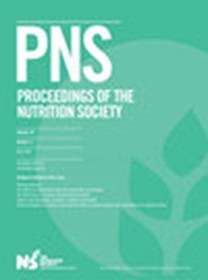高龄老人的硒状况与认知能力下降之间的关系:纽卡斯尔 85+ 研究
IF 4.5
2区 医学
Q1 NUTRITION & DIETETICS
引用次数: 0
摘要
众所周知,微量元素硒可防止氧化损伤,而氧化损伤是导致老年认知障碍的原因之一(1,2)。这项研究的目的是探讨居住在英格兰东北部的 85 岁老人的硒状况(血清硒和硒蛋白 P (SELENOP))与基线和 5 年后的总体认知能力之间的关系。使用标准化小型精神状态检查(SMMSE)评估总体认知能力,在满分30分中,得分≤25分表示认知功能受损。逻辑回归探讨了基线硒状况与总体认知能力之间的关系。线性混合模型探讨了 5 年后硒状况与整体认知能力之间的关系。在基线时,在完全调整模型中,血清硒(OR 1.004,95% CI 0.993-1.015,p = 0.512)或 SELENOP(OR 1.006,95% CI 0.881-1.149,p = 0.930)不会增加认知障碍的几率。同样,在5年的完全调整模型中,血清硒与认知障碍之间没有关联(β 7.20E-4 ± 5.57E-4,p = 0.197),SELENOP与认知障碍之间也没有关联(β 3.50E-3 ± 6.85E-3,p = 0.610)。尽管 SELENOP 在大脑中起着关键作用,而且在其他研究中也观察到了相关性,但这是一个出乎意料的发现。我们需要进一步研究硒对高龄成人整体认知能力的影响。本文章由计算机程序翻译,如有差异,请以英文原文为准。
The association between selenium status and cognitive decline in very old adults: The Newcastle 85+ Study
The trace element selenium is known to protect against oxidative damage which is known to contribute to cognitive impairment with ageing (1,2) . The aim of this study was to explore the association between selenium status (serum selenium and selenoprotein P (SELENOP)) and global cognitive performance at baseline and after 5 years in 85-year-olds living in the Northeast of England.Serum selenium and SELENOP concentrations were measured at baseline by total reflection X-ray fluorescence (TXRF) and enzyme-linked immunosorbent assay (ELISA), respectively, in 757 participants from the Newcastle 85+ study. Global cognitive performance was assessed using the Standardized Mini-Mental State Examination (SMMSE) where scores ≤25 out of 30 indicated cognitive impairment. Logistic regressions explored the associations between selenium status and global cognition at baseline. Linear mixed models explored associations between selenium status and global cognition prospectively after 5 years. Covariates included sex, body mass index, physical activity, high sensitivity C-reactive protein, alcohol intake, self-rated health, medications and smoking status.At baseline, in fully adjusted models, there was no increase in odds of cognitive impairment with serum selenium (OR 1.004, 95% CI 0.993-1.015, p = 0.512) or between SELENOP (OR 1.006, 95% CI 0.881-1.149, p = 0.930). Likewise, over 5 years, in fully adjusted models there was no association between serum selenium and cognitive impairment (β 7.20E-4 ± 5.57E-4 , p = 0.197), or between SELENOP and cognitive impairment (β 3.50E-3 ± 6.85E-3 , p = 0.610).In this UK cohort of very old adults, serum selenium or SELENOP was not associated with cognitive impairment at baseline and 5 years. This was an unexpected finding despite SELENOP’s key role in the brain and the observed associations in other studies. Further research is needed to explore the effect of selenium on global cognition in very old adults.
求助全文
通过发布文献求助,成功后即可免费获取论文全文。
去求助
来源期刊
CiteScore
15.50
自引率
0.00%
发文量
190
审稿时长
6-12 weeks
期刊介绍:
Proceedings of the Nutrition Society publishes papers and abstracts presented by members and invited speakers at the scientific meetings of The Nutrition Society. The journal provides an invaluable record of the scientific research currently being undertaken, contributing to ''the scientific study of nutrition and its application to the maintenance of human and animal health.'' The journal is of interest to academics, researchers and clinical practice workers in both human and animal nutrition and related fields.

 求助内容:
求助内容: 应助结果提醒方式:
应助结果提醒方式:


